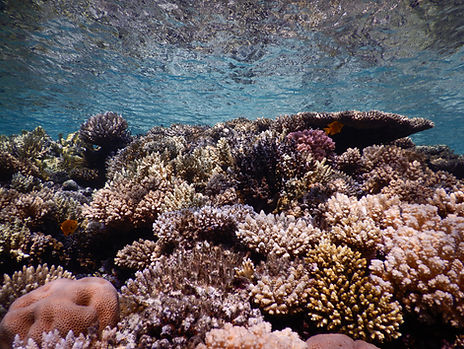top of page

Coral reefs globally are declining due to human-induced warming, acidification, and pollution. However, the GoA corals may survive climate changes, serving as a refuge due the Red Sea's unique oceanographic history, which is under further research.

CO2 vents as natural labs
We study benthic organisms in Mediterranean and tropical CO2 vent systems, examining their responses to pH gradients. These unique environments reveal the acclimation capacity of marine ecosystems.


Looking into the future using the Red Sea Simulator
The Red Sea simulator was designed to allow researchers to expose reef organisms to future conditions in the Red Sea.
Assessing how engineering species in the Gulf of Aqaba respond to global and local environmental changes.
This project is a collaboration between the Marine Science Station (MSS, Aqaba)/University of Jordan and the Interuniversity Institute for Marine Science (IUI, Eilat)/Hebrew University, Israel.

Can reef-building corals escape ageing?
Some argue corals can live for ever. Can they really and how do they do it? this project is a joint project with researchers from Stony Brook University, supported by an NSF-BSF grant.


The role of steroids and temperature in coral reproduction is vital for coral reef recovery which relies on successful reproduction. Understanding the factors affecting reproduction and identifying early signs of stress are essential for protecting threatened coral reef ecosystems. This project is a collaboration with Stony Brook University, funded an NSF-BSF grant.


Monitoring Coral's "Heartbeat"
The CMS I is the world's first real-time, open data coral monitoring station located the Gulf of Aqaba and the Red Sea. It collects diverse environmental data, including temperature, wind speed, and light intensity, as well as coral physiological performance from 8 colonies. This information is stored in an open-access database, facilitating global research collaboration on coral health environmental impacts. An underwater camera also provides real-time insights into reef-fish activity and coral pigmentation

Wave lensing and marine heatwaves.
Marine heatwaves (MHW) intensify due to reduced wind speeds, which allow heat to accumulate in surface waters This phenomenon is also linked to wave lensing, where focused light bands enhance light intensity on the seafloor, potentially disrupting coral-algae symbiosis and leading to coral bleaching. While the effects of higher sea temperatures are known, the influence of wave lensing on coral health during MHWs is less understood, presenting a vital research opportunity. This project aims to explore how wave lensing affects thermal dynamics and coral responses in shallow reef ecosystems, enhancing our understanding of coral vulnerability.

bottom of page